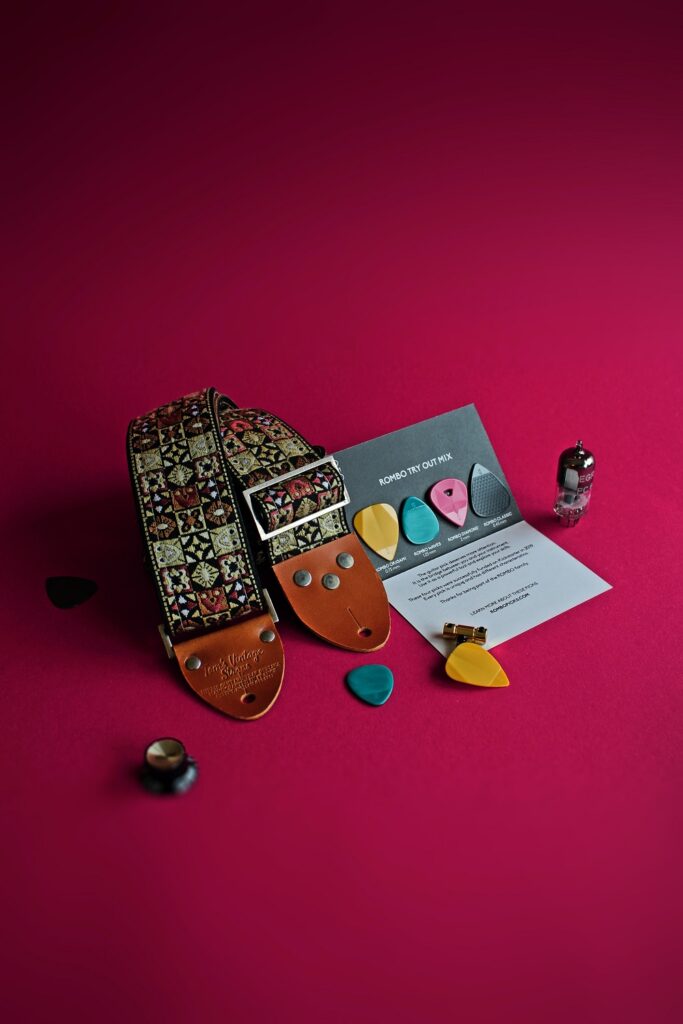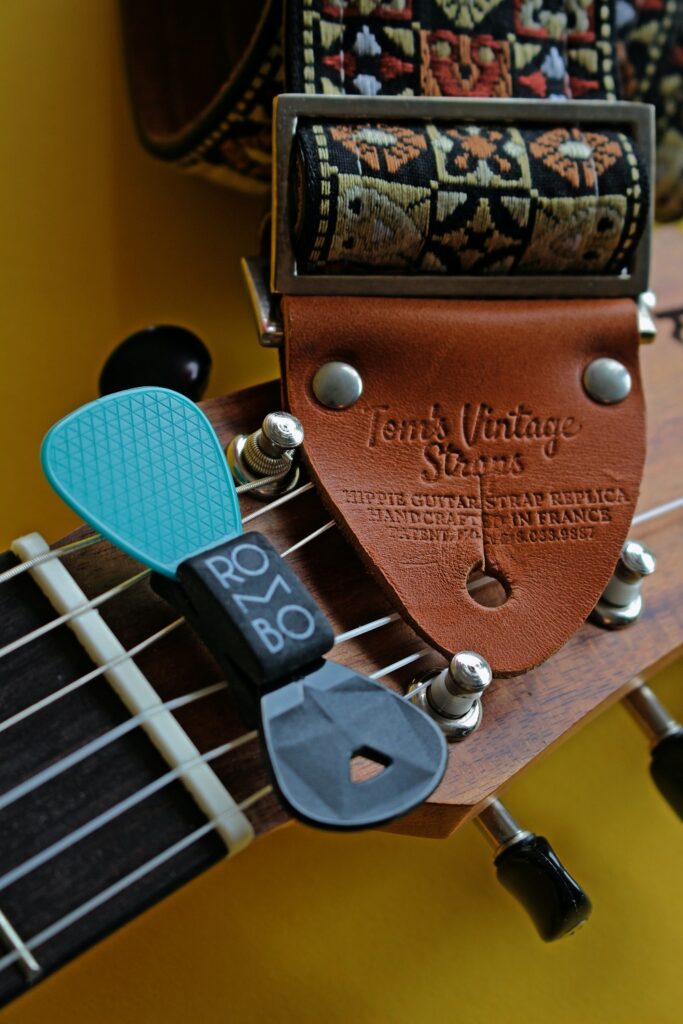
When it comes to playing the guitar, every detail matters. From the type of guitar and amplifier to the choice of strings and effects pedals, musicians, especially professionals, pay meticulous attention to their gear. Two often-overlooked yet crucial elements of a guitarist’s toolkit are picks and straps. These seemingly small accessories can significantly impact a player’s comfort, tone, and overall performance. In this article, we delve into the world of guitar picks and straps, exploring the top choices favored by professional musicians.
The Role of Guitar Picks and Straps
Before we dive into specific picks and straps, let’s understand why these accessories are so important for guitarists, especially professionals.
Guitar Picks: More Than Just a Tool
A guitar pick may seem like a simple piece of plastic or other material used to pluck the strings, but its significance goes far beyond that. Picks come in various shapes, sizes, and materials, and each choice can profoundly affect a guitarist’s playing style and sound.
- Tone and Attack: The thickness and material of a pick have a substantial impact on the tone and attack of the guitar. Thin picks tend to produce a brighter and softer sound, while thicker picks can create a warmer and more articulate tone. The attack refers to how the pick strikes the string, influencing the initial sound of a note.
- Playability: The grip and feel of a pick matter, too. A comfortable pick that sits well in a guitarist’s hand allows for more precise and controlled playing. This is especially crucial for professionals who demand consistency in their performance.
- Style Compatibility: Different musical styles require different pick choices. For instance, jazz guitarists often prefer thin, flexible picks for their smooth and mellow tones, while metal guitarists lean towards thicker, stiffer picks for their aggressive and articulate sound.
Guitar Straps: Comfort and Stability
Guitar straps serve a dual purpose: they keep the guitar in place while allowing the player to move freely on stage, all while ensuring comfort during long performances.
- Stability: A good guitar strap should securely hold the instrument’s weight, preventing accidental drops or slips during intense performances. Professionals need this assurance, as a dropped guitar can spell disaster on stage.
- Comfort: Long sets or gigs demand comfortable straps that won’t dig into the player’s shoulder or neck. Professional guitarists often perform for hours on end, making comfort a top priority.
- Style and Aesthetics: Straps are also a way for musicians to express their individuality. Pros often choose straps that not only provide functionality but also match their personal style and the image they want to project on stage.
Now that we’ve established the significance of guitar picks and straps let’s explore some top choices favored by professional guitarists.
Top Guitar Picks Used by the Pros
1. Dunlop Tortex Picks
Dunlop Tortex picks have been a staple in the guitar world for decades. These picks are known for their durability, consistent tone, and excellent grip. Professionals across various genres, from rock to metal, favor them. The Tortex series offers different thicknesses, allowing players to fine-tune their tone. Guitarists like John Petrucci, Dimebag Darrell, and Billy Corgan have all used Dunlop Tortex picks.
2. Fender 351 Shape Picks
Fender is a legendary name in the guitar industry, and their 351 shape picks are a favorite among many professional guitarists. These picks are available in various materials, including celluloid and tortoiseshell, catering to different tonal preferences. Eric Clapton, Jimmy Page, and Stevie Ray Vaughan have all relied on Fender 351 picks at various points in their careers.
3. Jim Dunlop Jazz III Picks
The Dunlop Jazz III is a favorite among shredders and virtuoso guitarists. These picks are smaller and more pointed, offering precise control and articulation. They come in various materials and even signature models, such as the John Petrucci Jazz III. Guitarists like Joe Satriani and Steve Vai are known to use these picks to achieve their lightning-fast, accurate playing style.
4. Gravity Picks
Gravity Picks have gained popularity among professional musicians for their handcrafted quality and unique materials. These picks are known for their tonal clarity and precision. Guitarists like Guthrie Govan and Andy Timmons have endorsed Gravity Picks for their exceptional playability and tone.
5. V-Picks
V-Picks are another boutique pick manufacturer that has earned a dedicated following among professional guitarists. These picks are crafted from acrylic and come in various shapes and thicknesses. They are prized for their bright, clear tones and smooth playability. Notable users include Billy Gibbons of ZZ Top and country virtuoso Brad Paisley.
Top Guitar Straps Used by the Pros
1. Levy’s Leathers
Levy’s Leathers is a well-known brand in the world of guitar straps, and many professionals swear by their quality and craftsmanship. These straps are available in various materials, including leather and suede, and they offer a wide range of styles to suit different preferences. Artists like Carlos Santana and Slash have used Levy’s Leathers straps throughout their careers.
2. D’Addario Planet Waves
D’Addario Planet Waves is known for producing reliable and comfortable guitar straps. They offer a variety of designs and materials, including padded options for extra comfort during long performances. Musicians like Keith Urban and Dave Mustaine have been seen using D’Addario Planet Waves straps.
3. Moody Leather
Moody Leather is a boutique strap manufacturer known for its high-quality, handcrafted leather straps. These straps not only provide excellent stability but also age beautifully over time, giving them a unique character. Musicians like Joe Bonamassa and Derek Trucks have been spotted with Moody Leather straps.
4. Gibson Straps
Gibson, one of the most iconic guitar companies, also produces high-quality guitar straps. These straps often feature the classic Gibson logo and are favored by professionals who play Gibson guitars. Artists like Angus Young of AC/DC and Tony Iommi of Black Sabbath have used Gibson straps during their careers.
5. Ernie Ball Polypro Straps
Ernie Ball’s Polypro straps are known for their affordability and reliability. These straps are lightweight and comfortable, making them a practical choice for long gigs. Professionals like John Mayer and Kirk Hammett have been seen using Ernie Ball Polypro straps.
In the world of professional guitar playing, every detail matters, and that includes the choice of picks and straps. These seemingly small accessories can have a profound impact on a guitarist’s tone, comfort, and overall performance. The top picks and straps used by the pros mentioned in this article represent a diverse range of choices, catering to different playing styles, tonal preferences, and aesthetics.
Ultimately, the best pick and strap for you will depend on your personal preferences and playing style. It’s essential to experiment with various options to find what works best for you. Whether you gravitate toward the durability and versatility of Dunlop Tortex picks, the precision of Jazz III picks, the craftsmanship of Levy’s Leathers straps, or the affordability of Ernie Ball Polypro straps, there’s a world of options to explore to enhance your guitar playing experience. So, go ahead, try some of these top picks and straps, and discover how they can elevate your performance to a professional level.
Generated by ChatGPT
